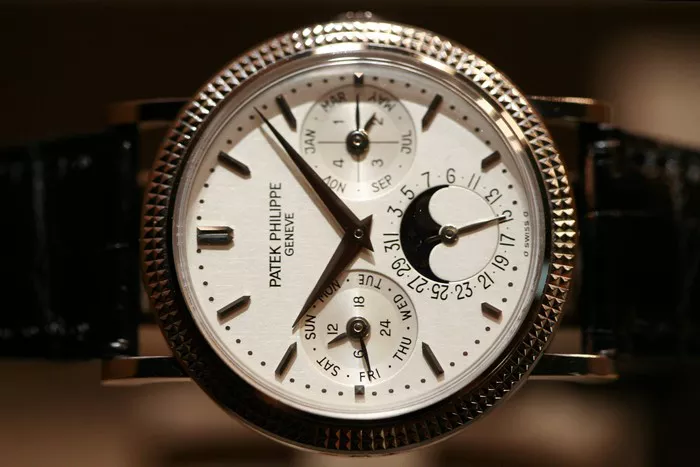Patek Philippe is synonymous with luxury, precision, and timeless elegance. Founded in 1839 in Geneva, Switzerland, Patek Philippe has built a legacy of creating some of the world’s most sought-after timepieces. Known for their exceptional craftsmanship, innovative designs, and unparalleled quality, Patek Philippe watches are the epitome of horological excellence.
Overview of Watch Movements
Watches generally operate using either quartz or mechanical movements. Understanding these movements is crucial to appreciate what Patek Philippe offers:
- Quartz Movements: Powered by a battery, these movements use a quartz crystal to regulate time. They are highly accurate and require minimal maintenance.
- Automatic Movements: These are self-winding mechanical movements powered by the motion of the wearer’s wrist. They are prized for their craftsmanship and complexity.
Patek Philippe’s Historical Use of Quartz Movements
While Patek Philippe is renowned for its mechanical watches, the brand has a notable history with quartz movements. In the 1970s, during the quartz crisis, Patek Philippe adapted by producing quartz watches to stay competitive. Notably, the Calibre 7/70 was one of the earliest quartz movements developed by the brand, showcasing their ability to innovate across different technologies.
Patek Philippe’s Commitment to Mechanical Movements
Despite its brief foray into quartz watches, Patek Philippe’s heart has always been with mechanical movements. The brand’s dedication to the art of watchmaking is evident in its complex automatic and manual wind movements. The intricate craftsmanship involved in creating these movements reflects Patek Philippe’s commitment to horological tradition and innovation.
Differences Between Quartz and Automatic Movements
Understanding the differences between quartz and automatic movements can help potential buyers make an informed decision:
- Accuracy: Quartz movements are more accurate than mechanical movements, which can lose or gain a few seconds per day.
- Maintenance: Quartz watches require battery replacements every few years, whereas mechanical watches need regular servicing.
- Craftsmanship: Mechanical watches, especially automatics, are often considered more prestigious due to the intricate engineering involved.
- Lifespan: Mechanical watches can last for generations with proper care, while quartz watches may need movement replacements over time.
Notable Patek Philippe Quartz Models
Although Patek Philippe’s current focus is on mechanical watches, the brand has produced several notable quartz models:
- Ellipse d’Or: Launched in 1968, this model featured a distinctive elliptical case and was one of the first to house a quartz movement.
- Twenty~4 Collection: Introduced in 1999, the Twenty~4 was designed for modern women and included both quartz and mechanical options. The quartz models are known for their elegance and practicality.
Notable Patek Philippe Automatic Models
Patek Philippe’s automatic watches are celebrated for their technical prowess and aesthetic beauty:
- Nautilus: Designed by Gérald Genta, the Nautilus is one of the most iconic sports watches, featuring a robust automatic movement.
- Aquanaut: A more contemporary design compared to the Nautilus, the Aquanaut also houses an automatic movement and is known for its sporty yet elegant appeal.
- Calatrava: A symbol of Patek Philippe’s dedication to classic design, the Calatrava collection features automatic movements and is revered for its timeless elegance.
- Grand Complications: These watches showcase Patek Philippe’s mastery in creating intricate movements, featuring perpetual calendars, minute repeaters, and other complex complications.
The Future of Patek Philippe Movements
Patek Philippe continues to innovate within the realm of mechanical watchmaking. While the brand occasionally uses quartz movements for specific models, the focus remains on refining and advancing mechanical movements. Innovations such as the Spiromax® balance spring and the Gyromax® balance wheel exemplify Patek Philippe’s dedication to pushing the boundaries of horology.
Why Choose Patek Philippe?
Choosing a Patek Philippe watch, whether quartz or automatic, means investing in a legacy of excellence. Patek Philippe’s commitment to quality, innovation, and timeless design ensures that each watch is a masterpiece. Here are a few reasons why Patek Philippe stands out:
- Heritage: Over 180 years of watchmaking expertise.
- Craftsmanship: Meticulous attention to detail and superior craftsmanship.
- Innovation: Continuous advancements in watchmaking technology.
- Value: Patek Philippe watches often appreciate in value over time.
- Prestige: Owning a Patek Philippe signifies discerning taste and an appreciation for fine horology.
Conclusion
When considering whether Patek Philippe watches are quartz or automatic, it’s clear that the brand excels in both categories, albeit with a stronger emphasis on mechanical movements. Patek Philippe’s history with quartz movements highlights its adaptability and innovative spirit, while its dedication to mechanical watchmaking underscores its commitment to tradition and excellence. Whether you choose a quartz or automatic Patek Philippe, you are acquiring a timepiece that embodies the pinnacle of luxury, precision, and enduring value.

